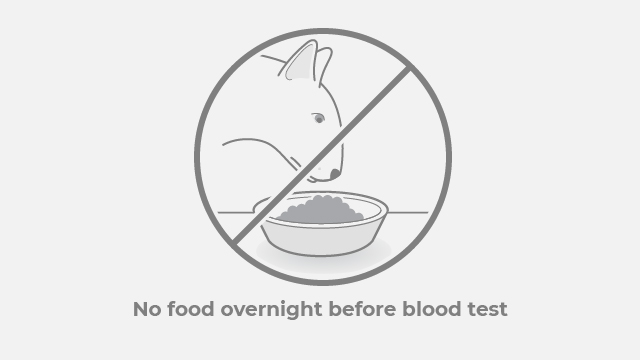
Bloodwork requirements for pets on longterm medication
Your pet has been prescribed longterm medication for a chronic condition. Blood tests give us vital information on how your pet is doing on that current medication dosage. Longterm medication can affect pets in different ways and often in ways that we cannot easily see.
Common blood tests as their requirements
| Condition | Blood test | Frequency | Fasting required (YES/NO) |
| Non-steroidal anti-inflammatory (NSAID) use e.g. for arthritis | Biochemistry | Twice yearly | YES |
| Digoxin e.g. for heart disease |
Digoxin levels
Kidney and liver profile |
Every month until the levels are stable
Every 3-6 months
|
YES |
| Insulin e.g. for diabetes | Glucose test | The testing frequency will be determined by the vet. |
NO Diabetics must NOT have fasted |
| Thyroid replacement medication e.g. for hyperthyroid or hypothyroid conditions | T4 |
6 weeks after starting medication Then every 3-6 months. |
YES |
| Phenobarbital or potassium bromide e.g. for seizures | Serum phenobarbital |
Monitored until a stable level is reached. Then every 6 months. |
YES Give medication in the morning and blood will be drawn 6-8 hours later. |
Fasting

This does not apply to diabetic pets.
Bloodwork results
Blood test results are typically available within 24-48 hours. Most of our blood tests can be done inhouse and results may be available earlier. These results are important in determining the next steps for the patient. We will endeavor to notify you of the results at the time of discharge or the following day by phone.
Why the need for rechecks and bloods before refilling your pet's prescription medication?
Veterinarians can only prescribe medications when a veterinarian-client-patient-relationship has been established. This means the veterinarian must see the client and patient on a regular basis, usually every 6-12 months, to re-examine the pet, perform blood work and/or determine if changes to the medication are required.
Wherever possible, please allow us at least 24 hours for your pet’s prescription medications to be refilled. This will allow the veterinarian to review your pet’s medical record, make sure no further changes are required and whether your pet is required to be re-examined again.
Reading the label
All medications prescribed and dispensed by your veterinarian will include:
- Pet first and last name
- Date of dispensing
- Drug details
- Dose and duration
- Route of administration
- Cautionary statements
- Veterinarian details and Clinic details
Please make yourself familiar with these details and contact us if you have any questions.
Handling, Storage and Disposal
Your veterinarian will inform you about appropriate drug handling, storage, and disposal.
